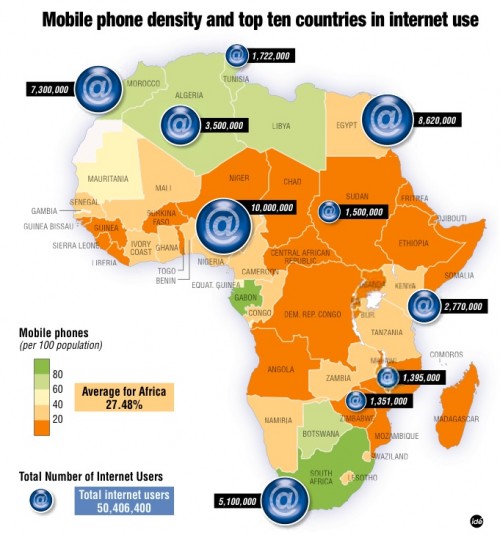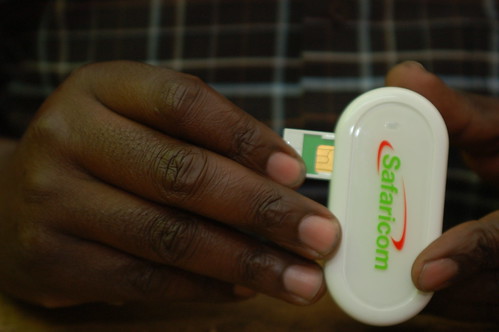The Africa Report’s quarterly magazine has come out, this time with a report on mobile phones, internet penetration, BPO zones and mobile banking. If you’re not subscribed to this quarterly magazine yet, you should – it’s available in almost every country. Personally speaking, it’s one of only three magazines I subscribe to (the others are MAKE and Technology Review).
“The division between the ICT ‘haves’ and ‘have-nots’ now runs through the heart of the continent, geographically and generationally. While young urban Kenyans and Nigerians feel at home messaging one another on social-networking sites, the elders in the rural landlocked hinterlands have yet to send an email, and many have never made a phone call. Tunisia and Morocco compete furiously with one another in the business process outsourcing (BPO) market for francophone call centres, but most businesses in the Sahel have never heard of doing their accounts on Excel spreadsheets.
Mobile Broadband Internet in Africa
While it’s good to talk about mobile phone penetration, I was a lot more interested in seeing the discussion going on around mobile broadband internet and how that is the next big move in Africa for the operators. Passing data, not just voice, is the battleground of the future in Africa – and all the carriers are fighting to position themselves to win.
I saw this happening in my most recent trip to Kenya where the local ISPs are very much aware of their dongle-toting SIM card competition (see image below) found in Safaricom and Celtel. As voice services begin to erode for mobile carriers in Africa, they have to find new ways to compete. Of course, this means more and increasingly cheaper options for consumers around the continent.
With new carriers still entering into the fray, older ones having to change their business strategies, and ISPs who are also getting better international bandwidth connections the real battle for the internet in Africa is just beginning. It’s very much of a “wild west” atmosphere with huge stakes at both the country and regional levels.
[download the extract of this article here, a 772Kb PDF)


August 8, 2008 at 8:22 am
Hopefully entry of new carriers might eventually also improve network reach. We have been trying to use safaricom usb modems with 2 rural communities in Kenyan to support them using the web for communication, information needs and blogging. This has been very difficult so far in one area largely because of the very poor coverage. We had to switch operator and for the time being have given up. In another area this experiment is beginning to be more successful (see http://silanga.blogspot.com) . Of course, another issue is training for rural communities and them learning about the Web and how they might use it and maybe blogging to improve their livelihoods.
I wonder whether active members of the Kenyan blogging community might share skills and expertise with these rural communities if passing through the areas?
August 8, 2008 at 10:27 am
Josh, very interesting website and project. On your first issue of coverage in rural areas, that does continue to be a problem. However, as competition increases, so does the need for operators to increase coverage. I’d like to get a map with a mobile phone coverage overlay in any nation in Africa over the last 10 years – it would be interesting to see how it has grown and how a new operator increase that growth rate.
On your thoughts about training in rural communities… I’ve been thinking about how penetration of mobile phones and how to use them effectively needed no outside intervention to happen. The technology moved to the villages and family members were usually the ones who brought it and taught it. Most Kenyans who live in urban areas go out to shags (their homes upcountry) at least once per year, and they take a lot with them when they do.
I wonder if knowledge transfer done that way works best?
August 8, 2008 at 12:23 pm
I am presently working on spreading the word on the role that broadband wireless and fixed DSL/Fiber can play in the development cycle of a country, especially those in Africa. My work has been concentrated in Eastern Europe and Uganda, but I have written papers about other countries within Africa. I just attended a conference in Ghana where there Ministers of Telecom got the message that they had to open their Internet gateways to encourage competition, reduce the cost for backbone and allow for the spread of broadband throughout the country. Senegal is an example of a country which has blocked the international gateway in favour France Telecom. Anyway, I would love to be part of the group helping to move Africa forward into the use of broadband be it fixed or wireless for Internet access.
August 10, 2008 at 3:25 am
I have been an optimist on Africa for sometime, even with the many failed predictions of an African economic takeoff that have been made in the past. And when South Africa had a major electricity crisis which revealed the state of the lack of investment there I did not take it as representative of the state of Africa’s infrastructure. But with the Central African Republic and Zambia and of course Zimbabwe highlighting poor job of maintenance that has gone on since independence, I am beginning to wonder if optimism in Africa can be justified. China can not replace the continent’s entire electrical system and even if they could, will nations that can not keep the electrical system running without a massive rescue efforts be able to succeed? While I was, until very recently, bullish about Africa, I am beginning to wonder if any lands south of the Sahara have a future in the near or medium term time frame – at least as anything more than underdeveloped backwaters. It is very discouraging.
August 17, 2008 at 8:49 am
I believe exciting times lie ahead for the Kenyan ICT sector.
Safaricom has rolled out 3G services in Nairobi and Mombasa. Zain (formerly Celtel Kenya) has a reliable EDGE unlimited internet offer. Telkom Kenya has made steps towards broadband internet provision. Econet Wireless will join them later.
Naturally, the cost of accessing internet services is set to go down.
Let us wait and see. Our best days might just be ahead of us all.